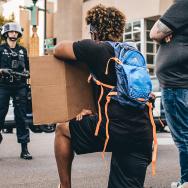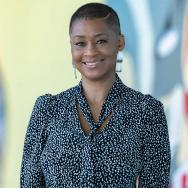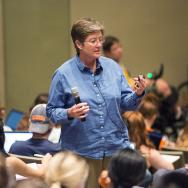Assoc. Prof. Reuben Jonathan Miller, a renowned sociologist who studies mass incarceration and how it shapes people’s lives, has been awarded a 2022 MacArthur Fellowship.
Awarded by the John D. and Catherine T. MacArthur Foundation, the prestigious fellowship recognizes individuals from across disciplines who “show exceptional creativity in their work.” As one of this year’s 25 MacArthur fellows, Miller will receive a no-strings-attached grant of $800,000 over five years to support creative pursuits.
Miller joins more than 50 people associated with UChicago to have won a MacArthur Fellowship. Also among the 2022 class is Amanda Williams, Lab’92, a Chicago-based artist and architect.
“I have, of course, dreamed that I’d win the lottery. I've also dreamt that somebody would hand me a deed to a new house. This was sort of on that level,” said Miller, AM’07, a scholar in the Crown Family School of Social Work, Policy, and Practice and the American Bar Foundation. “To get the call, it was incredible. Just incredible.”
Crime and punishment
In the United States, one in two people have a family member who has been incarcerated; for Black Americans and other communities of color, that number is even higher. Miller argues that the criminal justice system harms those in poverty, and is especially hard for Black people. “But it’s not just a Black problem,” Miller said. “Another way that racism works is that it hides the effects of bad government policy.”
In order to probe at the policies and institutions that shape our justice system, Miller focuses on the human toll of mass incarceration—the long-term consequences on people who’ve served time and the loved ones who care for them.
“I study people who we’ve taught ourselves to fear, and we taught ourselves to overlook,” Miller said. “I don't think we give enough thought to how to incorporate people who've made mistakes back into the social fabric of our country.”
How prison lives on in people
Each year more than half a million Americans are released from prison. However, Miller argues, the effects of incarceration linger even in “freedom.”
Millions of formerly incarcerated people must navigate thousands of laws and policies that limit their ability to fully participate in society—restricting them from full citizenship and condemning them to life on the outskirts of society. Miller found that many people living with criminal records find it difficult or impossible to find employment, vote or secure stable housing.
“The prison lives on through the people who've been convicted long after they complete their sentences,” Miller writes in his first book Halfway Home: Race, Punishment and the Afterlife of Mass Incarceration. “It lives on through the grandmothers, lovers and children forced to share their burdens because they are never really allowed to pay their so-called debt to society.”
As a former Cook County Jail chaplain, Miller saw the “afterlife” of mass incarceration first hand. For 15 years, he followed the lives of those navigating the carceral system in cities across the U.S., including Chicago and Detroit. Miller spent time with the families, partners and friends of formerly incarcerated people to understand the long-lasting burden of a prison sentence. During the course of his research, Miller’s own brother entered the prison system.
In announcing Miller in its 2022 class of fellows, the MacArthur Foundation recognized the intimate nature of Miller’s work.
“Rather than separating his research from his personal experiences, Miller sees his experience as an asset,” the Foundation wrote. “It enables him to convey more powerfully the full humanity of his subjects and the complex social realities in which they are embedded. The resulting immersive work is part memoir and part sociological study of the intersection of the criminal justice system with race and poverty.”
This proximity, an approach Miller calls “the sociology of being together,” helps him push back against the traditional distance taught in social science research. In fact, he argues that it is this very proximity that’s needed for change.
“I want people to know what it’s like to live with the mark of a criminal record, what it’s like to love someone who has a criminal record,” Miller said. “I believe policy solutions cannot be offered if we don’t allow that experience into the model.”
The work continues
The prize will help support Miller’s future research, which are two large-scale international projects. The first is a study of violence: how we understand it, deploy it and what we do to people our society has labeled “violent.” As part of the project, Miller is conducting hundreds of interviews with individuals convicted of violent crimes or identified as at risk of violent behavior.
The second, related project studies global Black emancipation. “I'm curious about how countries that depended on slavery recovered from the loss of that institution,” Miller said. “And what happened to free Black people and the many poor workers, whom we might call white today, that were drawn into the slave economy of those countries.”
For Miller, a trained social worker, the fellowship is an acknowledgement of work traditionally taken on by women and people of color.
“It's going to shine a light on the importance of folks who are in the trenches doing this kind of work,” he said, “from activists and organizers, to academics and everyday social service providers.”



